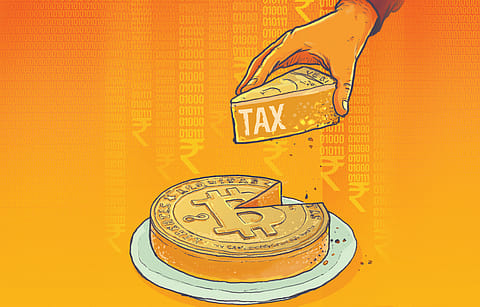Crypto tax becomes law amidst industry outcry against high tax rate
As per the new crypto tax law, loss from the transfer of virtual digital assets will not be allowed to be set off against the income arising from transfer of another VDA.

The taxation of virtual digital assets (VDAs), commonly referred to as "crypto tax" will come into force from April 1 as the Lok Sabha passed the Finance Bill on Friday. As per Section 115BBH of the Finance Bill, gains in cryptocurrencies will be taxed at 30%. This would apply to all "virtual digital assets" right from Bitcoin, Ethereum, and all other coins to NFT and related earnings. As per the new crypto tax law, loss from the transfer of virtual digital assets will not be allowed to be set off against the income arising from transfer of another virtual digital asset. Also, infrastructure costs incurred in mining of VDA (eg. crypto assets) will not be treated as cost of acquisition and the same will not be allowed as deduction under the Act. A 1% TDS will also be held back each time you sell a crypto asset, whether there is profit or loss, and will be set-off against the crypto tax at the end of the year. The industry stakeholders are discontented with the crypto law in its current form. The industry had expressed its unhappiness with the "no set off of losses" rule earlier as well and they had asked the government to revisit the provisions and discuss it with the stakeholders.
"Implementing single tax for single crypto rule will be a massive blow to the nascent crypto industry in India," says Shivam Thakral, CEO of BuyUcoin. If an investor buys Bitcoin in April, and sells it at a loss and investor again buys a Bitcoin in July and sells it at a profit within the same financial year, how will that scenario play out? That's the reason, adds Thakral, "we had urged the regulators to take a nuanced approach towards crypto and discuss it with the industry stakeholders before arriving at a final decision".
Industry seems frustrated with the highest tax rate of 30% on crypto gains as well, which is on par with taxation of winnings from lottery. While this would result in a 5% increase in tax payable by companies trading in cryptocurrency, this would more significantly affect smaller "retail investors" who may be in lower tax brackets or have been relying on lower capital gains tax rates.
The highest tax, irrespective of whether crypto-assets are capital assets or not, will be detrimental to the investor growth that the industry has been seeing so far. As per Nischal Shetty, founder and CEO, WazirX, this move will make day-traders incapable of saving on taxes even if they aren't in the income tax brackets currently. Furthermore, he adds that not allowing investors to offset losses from one crypto trading pair by gains from another type will further deter crypto participation and throttle the industry growth.
The 1% TDS on every transaction has also raised hue and cry among industry participants. Ritesh Pandey, BSP Member of the Lok Sabha, said that the 1% TDS will kill this new asset class and should be removed.
With the current taxation structure, believes Thakral of BuyUcoin, the overall picture of the cryptocurrency industry in our country looks gloomy. Thakral adds that excluding mining cost from the acquisition cost will also discourage investors from investing in crypto assets with a high maker fee. "Crypto mining in India is done at a very small scale and such steps will hamper the mining prospects in India," he says.
While many in the cryptocurrency industry initially welcomed the inclusion of VDAs in the Finance Bill, 2022, a deeper look at the Finance Bill demonstrates the government's reluctance to encourage growth in this space. "Crypto players need to present a united front and challenge these overbearing provisions," says Probir Roy Chowdhury, partner, J. Sagar Associates (JSA). Trading in crypto/virtual digital assets is not akin to gambling and this distinction needs to be made clear, adds Chowdhury.
Recommended Stories
The crypto tax law, in its current form, is poised to do more harm than good. It can result in cascading participation on Indian exchanges, says Shetty of WazirX, that adhere to the KYC norms and lead to a rise in capital outflow to foreign exchanges or to the ones that aren't KYC compliant. "This is not conducive for the government or the crypto ecosystem of India," he adds.
As per Charles Tan, head of Marketing at Coinstore, the current crypto taxation laws may undergo adjustments to match global expectations as the crypto industry in India, he says, enters a more mature phase. "We are hopeful that Indian regulators will reach a consensus with the crypto industry soon."